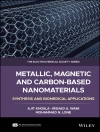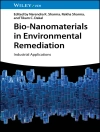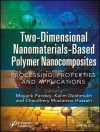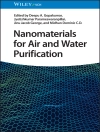Edited by the initiators of a priority research program funded by the German Science Foundation and written by an international team of key players, this is the first book to provide an overview of nanostructured thermoelectric materials — putting the new developments into perspective alongside conventional thermoelectrics.
As such, it reviews the current state of research on thermoelectric Bi2Te3 nanomaterials, covering advanced methods of materials synthesis, characterization of materials structures and thermoelectric properties, as well as advances in the theory and modeling of transport properties. Nanomaterials-based thermoelectric devices are also discussed with respect to their properties, their suitability for different energy generation applications, and in light of their commercialization potential. An outlook on the chances, challenges and future directions of research rounds off the book, giving a straightforward account of the fundamental and technical problems – plus ways to overcome them.
Jadual kandungan
INTRODUCTION
Synthesis of Nanowires, Thin Films, and Nanostructured Bulk
Gas Phase Synthesis of Thermoelectric Nanowires
Bi2Te3 Nanowires Fabricated by Heavy Ion Structuring and Electrodeposition
Fabrication and Comprehensive Structural and Transport Property Characterization of Nanoalloyed Nanostructured V2VI3 Thin Film Materials
Bulk-Nanostructured Bi2Te3 Based Materials: Processing, Thermoelectric Properties and Challenges
STRUCTURE, EXCITATIONS, AND DYNAMICS
High Energy X-Ray and Neutrons Scattering on Bi2Te3 Nanowires, Films, and Bulk Materials
Analytical Transmission Electron Microscopy for Control and Analysis of Stoichiometry, Texture, Nanostructure, and Dimensionality
THEORY AND MODELING
Density-Functional Theory and Atomistic Study of Point-Defects in the Thermoelectric Bi2Te3
Boltzmann Transport Theory Applied to Bi2Te3
THERMOELECTRICITY MEASUREMENT METHODS
Thermoelectric Properties of Polycrystalline Bi Sb Te Films in the Thickness Range 50-300 Nm
Fraunhofer-IPM’s Measurement Capabilities for Thermoelectrics
Analysis of Thermoelectric Nanowires in a Microfabricated Characterization Platform
Seebeck Measurements of Single Nanowires
Thermoelectric Investigations of Individual Bi2Te3 Nanowires
THERMOELECTRIC DEVICES
Thin Films with the Tetradymite-Type Structure: Growth, Properties and Applications
Bi2Te3 Nanomaterials for Thermoelectric Devices – Advantages and Opportunities for New Markets
CHALLENGES OF Bi2Te3 NANOMATERIALS
Novel Approaches for Obtaining Higher Thermoelectric Efficiencies
Bi2Te3 Nano Thermoelectrics in Real Devices
Further Development of Measurement Methods, Characterization and Modeling
Summary
Mengenai Pengarang
Kornelius Nielsch is Professor for Experimental Physics at the Institute of Applied Physics of the University Hamburg, Germany, and coordinator of the German Priority Program of Thermoelectric Nanostructures, funded by the German Science Foundation (DFG). After his Ph D obtained for a doctoral thesis carried out at Max Planck Institute of Microstructure Physics in Halle, Germany, he was postdoctoral associate at MIT, USA. From October 2003 to December 2008 he was leader of the a nanotechnology research group funded by the German Federal Ministry of Education and Research (BMBF) on Multifunctional Nanowires and Nanotubes at the Max Planck Institute in Halle. He received the State Research Prize for Basic Research from the State of Saxony-Anhalt in 2006. In the same year he was appointed Full Professor for Experimental Physics in Hamburg.
Friedemann Völklein is Director of the Institute for Microtechnologies (IMtech) and Professor for Physical Technologies and Microsystem Technology at the Rhein Main University of Applied Sciences in Wiesbaden. He received both his Ph D and DSc degrees in Physics from the University of Jena, Germany. He specializes in solid-state physics of thin films and their applications in thermoelectric microsensors and microactuators. Before his move to Wiesbaden, he was head of the sensor department of the Institute for Photonic Technology (IPHT) Jena and senior scientist in the Physical Electronics Laboratory of the ETH Zurich, Switzerland.
Oliver Eibl is Professor for Applied Physics at the University of Tuebingen. He spent fifteen years as researcher at Siemens Corporate Research in Munich and started his university career in Tübingen in 1999. His field of research is electron microscopy and applied materials science. He is author of more than 100 scientific papers and holds more than ten patents. He has reviewed numerous scientific papers and has acted as a referee for numerous scientific research proposals.
Nicola Peranio is Research Scientist in Professor Eibl’s group at the University of Tübingen. He received his Master degree from Karlsruhe Institute of Technology and his Ph D from the University of Tübingen in 2008. In 2009 he obtained the Young Investigator Award from the German Thermoelectric Society (DTG) for his Ph D thesis on Bi2Te3 bulk and nanomaterials.












